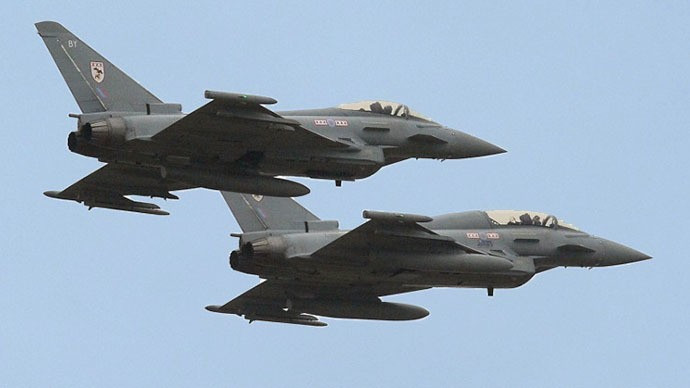RAF Scrambles Typhoons over Cyprus after 'Goad and Probe Sortie' by Rogue Syrian Jet

The RAF sent two Typhoon jets into the skies over Cyrpus after an unidentified aircraft thought to be from Syria was detected on radar.
The Ministry of Defence confirmed the deployment of two Typhoons after the rogue plane, thought to be a Russian-made Sukhoi Su-24, was spotted.
In response to the alert, Turkey's air force deployed an additional two F-16 fighters from its airbase at Incirlik.
Military chiefs said they suspected the plane was engaged in a "goad and probe" sortie.
An MoD spokesman said: "Typhoon Air Defence Aircraft operated from RAF Akrotiri on Monday, 2 September 2013, to investigate unidentified aircraft to the east of Cyprus. The aircraft were flying legally in international airspace and no intercept was required."
The MoD later confirmed that the suspicious aircraft made no incursion into Cypriot airspace before it flew away.
'High readiness'
"This is a clear sign of the tension boiling over because of Syria. Everyone is on edge," said a source at the base.
"It is a pretty serious move to send up Typhoons. One of their roles is to intercept any possible enemy strike."
Air traffic control sources in Cyprus said Syrian air force jets had been observed flying over the city of Famagusta within North Cypriot airspace.
Britain sent a further six Typhoon fighters, the UK's latest interceptor jets, to the RAF base at Atrokiri in Cyprus last week, in what the MoD called a "prudent and precautionary measure".
A senior RAF source said: "It seems that this incident may have been a case of a goad-and-probe sortie by a Syrian air force acting more brazenly than ever after recent inaction by the West.
"As the delivery of six Typhoons would suggest, Atrokiri is on high readiness in case of any Syrian incursion."
The alert came as US Secretary of State John Kerry said the number of nations ready to take military action against Syria was rising, and had now entered "double digits".
Kerry held talks with French foreign minister Laurent Fabius and EU representatives in the Lithuanian capital, Vilnius, following the break-up of the G20 summit in St Petersburg.
"There were a number of countries, in the double digits, who are prepared to take military action," said Kerry.
"We have more countries prepared to take military action than we actually could use in the kind of military action being contemplated."
The EU's foreign policy chief, Catherine Ashton, had called for the EU to take action in response to Syrian president Bashar al-Assad's use of chemical weapons against civilians in Damascus on 21 August.
However, she urged the US to await the UN weapons inspectors' report into the atrocity before launching military action.
British Prime Minister David Cameron has ruled out a second parliamentary vote on UK involvement in any air strikes, after he was defeated in a Commons vote ten days ago.
While British activities within Syria are said to have been suspended since parliament's "No" vote, Britain is still involved in "non-kinetic" operations.
These are focused on electronic counter measures, monitoring Syrian air force movements and intercepting communication from a base on Mount Olympus, Cyprus.
More than 600 Royal Marines from 30 and 42 Commando units, in full chemical weapons suits, will be deployed to Aqaba, Jordan, next week for war games.
© Copyright IBTimes 2025. All rights reserved.





















